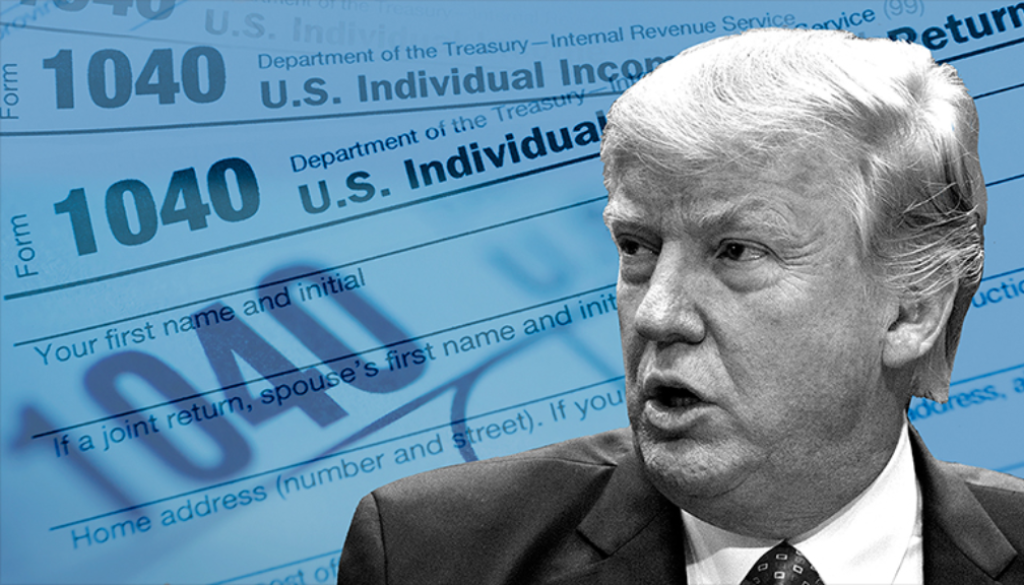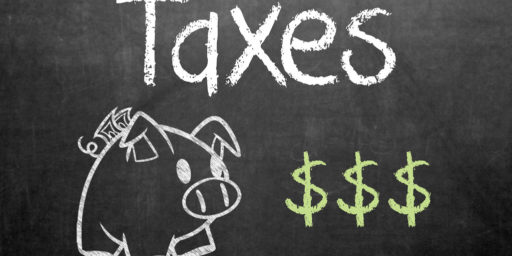Trump’s Tax Cuts Haven’t Resulted In The Economic Benefits He Promised
A new study reveals that the Republican tax cut package passed at the end of 2017 has not had the economic impact the GOP claimed it would.

A new report indicates that the tax reform package that Republicans passed at the end of 2016, which remains the single big piece of legislation that the GOP managed to pass while controlling both ends of Pennsylvania Avenue, had almost no impact on business investment hiring:
WASHINGTON (Reuters) ― The Trump administration’s $1.5 trillion cut tax package appeared to have no major impact on businesses’ capital investment or hiring plans, according to a survey released a year after the biggest overhaul of the U.S. tax code in more than 30 years.
The National Association of Business Economics’ (NABE) quarterly business conditions poll published on Monday found that while some companies reported accelerating investments because of lower corporate taxes, 84 percent of respondents said they had not changed plans. That compares to 81 percent in the previous survey published in October.
The White House had predicted that the massive fiscal stimulus package, marked by the reduction in the corporate tax rate to 21 percent from 35 percent, would boost business spending and job growth. The tax cuts came into effect in January 2018.
“A large majority of respondents, 84 percent, indicate that one year after its passage, the corporate tax reform has not caused their firms to change hiring or investment plans,” said NABE President Kevin Swift.
The lower tax rates, however, had an impact in the goods producing sector, with 50 percent of respondents from that sector reporting increased investments at their companies, and 20 percent saying they redirected hiring and investments to the United States from abroad.
The NABE survey also suggested a further slowdown in business spending after moderating sharply in the third quarter of 2018. The survey’s measure of capital spending fell in January to its lowest level since July 2017. Expectations for capital spending for the next three months also weakened.
“Fewer firms increased capital spending compared to the October survey responses, but the cutback appeared to be concentrated more in structures than in information and communication technology investments,” said Swift, who is also chief economist at the American Chemistry Council.
When the tax bill was being debated in Congress, Republicans were all over the media promising that passing the package, which included reductions in both personal and corporate income tax rates, would lead to a stronger economy, jobs growth and increased revenue to the Federal Government. While there have been some positive economic statistics on an isolated basis, those promises have gone largely unfulfilled. Indeed, both economic and jobs growth have, by and large, remained the same as they were during President Obama’s second term. wage growth, which many economists are now saying is the more important number now that we’re nearing the point of full employment, has been stubbornly slow for the past two years. Meanwhile, the corporate expansions that Republicans said would happen have not materialized and many corporations have been using the tax savings they are receiving from the new tax law to fun stock buybacks. Finally and perhaps most disappointing to Republicans, the changes to corporate taxes have not resulted in the repatriation of corporate profits parked overseas that they claimed would occur in the wake of the tax cuts. Instead, corporations have chosen to keep those profits where they are rather than paying additional corporate taxes as a result of repatriation, even if the tax rate is lower than it used to be.
In addition to a decided lack of apparent economic benefit, the tax cut package has also come with the economic bad news. Just months after the tax bill became law, for example, the Congressional Budget Office estimated that it would add $1.9 trillion to the Federal Budget Deficit over the course of ten years. This came at the same time that, independent of the tax cut bill, it was becoming clear that we were heading back toward the $1 trillion budget deficits we saw at the beginning of the Obama Administration when the economy was still recovering from the Great Recession. When the final budget deal was put forward in mid-February of last year, it included massive spending increases in almost every budget category and busted through the controls that had been put in place by the Budget Control Act of 2011, a controversial bill passed during one of the many fiscal showdowns between former President Obama and Congress that occurred after Republicans captured the House in 2010. As The New York Times noted at the time, this effectively means that Republicans have learned to love the deficits and debt they once claimed to abhor. In other words, the Republican Party, which had spent the Obama years railing about spending and deficits, had become the party of deficits and debt. By April of last year, the Congressional Budget Office had officially forecast that we’d be seeing trillion dollars deficits by the end of Fiscal Year 2019 and just a few months later, the national debt crossed a new benchmark and was north of $21 trillion. Finally, earlier this month it was reported that the annual deficit was on a pace to exceed $1,000,000,000,000 for the current Fiscal Year, which ends on September 30th. Add the impact of the tax package into this and it’s clear that the entire package has failed to achieve what Republicans hoped for when they passed it more than a year ago.
Finally, it’s worth noting that the tax package did not have the positive benefit for Republicans that they hoped it would. Initially, Republicans had hoped that the combination of slightly higher take home pay for many workers, bonuses, and a positive impact on the economy would help them stave off a Democratic wave in the midterm elections. As I noted several times during the course of the campaign though (see here and here), it was apparent that the tax bill itself had proven to be so unpopular among voters that most Republican candidates had largely abandoned bringing it up on the campaign trail. The results on Election Day were similarly bad when it came to the so-called “Tax Cuts And Jobs Act,” and that the new law was actually a net negative in states where changes such as the treatment of deductions for property and other state taxes had the most negative impact. Instead, the law clearly hurt Republicans in high income, high-tax districts where residents were upset about the newly established cap on deductions for state and local taxes. As a result, while Republicans did pick up a handful of Senate seats, their losses in the House were the worst the party has suffered since the post-Watergate election in 1974 and nearly as bad as the losses they suffered in the 1930 Congressional Elections





It’s almost as if all that positive stuff they said about this massive giveaway to the 1% was pretext to obscure the fact they were about to do a massive giveaway to the 1%.
Nobody could have predicted this except all of us who predicted it…
Oh, I’m quite sure it achieved exactly what they hoped for. They just lied about what that was.
Countdown to blaming the Democrats, as businesses were too scared to spend because of all the threats Democrats made about retaking Congress and undoing all the tax reforms and increasing taxes and making them retroactive to 2016….something something…
10….9….8…7….
No one really knew what would happen if you had a large tax cut when the economy was already doing well. Now we kind of know. It mostly makes rich people richer.
Steve
the local paper here in North Florida literally told him “Thank You President Trump!” for presiding over “The longest economic expansion in US history”.
it should surprise no one that this county is slightly under 80% white, and went for Trump 71%.
The subject of this thread is directly tied in with the other one about the closing of the conservative mind…yes, we all know that the tax cuts were unneeded and unnecessary but to the Trump/Fox News crowd, this is all fake news…how can any accommodations and compromises be made with such people…
I wonder whether there’s a point where someone thinks they’ve made enough money and don’t need more.
Sure, there are some very rich people like Bill Gates who give a lot of money away. And others like Elon Musk who use their money on revolutionary ventures, which they think will change the world for the better.
But most rich people strike me as Mr. Burns in The Simpson’s. There’s a line where Homer tells him “You’re the richest man I know.” He answers, “True. but I’d trade it all for just a little more.”
I like bashing Trump ‘policies’ as much as the next guy, but shouldn’t we wait until these corporations have actually seen how much their taxes go down before we draw conclusions about whether they are responding as intended? I think uncertainty in exactly what the impact of the tax law changes would be is probably a big factor here. Tax year 2018 final results won’t be in for a while yet.
~ William Blum
You know, I did some checking, and the Federal BLS statistics show that in Obama’s last 2 years a total of 5.0M jobs were created, while the first 2 years of the Trump presidency 4.8M jobs were created.
Just saying.
@Kathy:
I have an actual number. Really. I want 20 million because then I can pull out a million a year and if you can’t have a really good life with that just hang yourself. I am, BTW, nooooowhere near that, and exceedingly unlikely to get there. I mean, I’d have to work my wife like a mule and I believe she’d resent that. But I thought I should have a point where I can go, ‘Yep, that’s enough.’ Then I give anything else away and swan around like a humanitarian.
@Michael Reynolds:
That’s good to know.
The follow-up question would be: do you employ anyone? I’m thinking you may have an assistant, secretary, housekeeper, people along those lines.
Don’t we already know what corporations are doing with these tax cuts? Certainly they aren’t benefitting employees all that much…
Has this sort of economic move ever actually performed the way Republicans say it does? I mean, sure, there’s Kennedy, but c’mon… I was eight years old when Kennedy was elected and taxes were really high. So high that it’s entirely possible that we were on the right side of the Laffer Curve for tax cuts to result in higher productivity.
I’m asking has it worked recently? Since maybe I was half the age I am now? During my adult lifetime?
Trump’s success has been as a reality show host. He has no expertise in setting economic policy. When you hear a pitchman tell you that his potion cures baldness, cancer, and dandruff, you should probably take that with a grain of salt. Trump’s closest advisor is his son-in-law who is famous for spending about a billion dollars for a mid-town Manhattan property than it was worth. Trump could not make money running a casino!
@An Interested Party:
Not really. We know (more or less) what corporations are doing in anticipation of these tax cuts — but there hasn’t actually been a tax cycle yet where the tax cuts were in effect. They don’t actually have the money in hand yet. Given the overall unpredictability of the administration and the economy at the moment, I’m speculating that this matters.
The long-term effects of the tax cut will be the various damages from the growing deficit. So the short-term effects better be damn good. Judging from the stock market, it’s a resounding flop.
@Just nutha ignint cracker:
Kennedy proved that yes, supply side tax cuts can work. But only Democrats know how. (Or know how to recognize the right conditions.)
Kennedy was quite right to recognize, as you note, that high rates could reduce revenue, long before Laffer. Actually, the Econ profession knew this, and knew the magic number was around 70%, a fact that still eludes Laffer and the Republicans.
Where Kennedy erred was in believing maximum revenue should be the goal. The goal is really to reduce the number and wealth of billionaire political ratfwckers. Howard Shultz clearly has more money than is good for the country. And the Kochs, Adelson, Friess….
@Kathy:
I retired this year, relatively young (my early 50s) for just this reason – we have enough, there’s no point to more. I think many wealthy people lose sight of the entire point of the money.
If you have accumulated enough for a few lifetimes, maybe stop doing that now and figure out other aspects of life?
Surprise surprise surprise!
@Kathy:
I employ no one. My wife has a company she pays to handle fan mail, but otherwise, no. We have no Downton Abbey envy, we don’t want servants.
@Michael Reynolds:
Thank you.
Then there’s no point to further grilling.
@Tony W:
Yes, but that’s only part of it. I mean, people like Bill Gates kind of have done that.
@DrDaveT:
Good point. I hadn’t thought from that side of the question.
@gVOR08:
I agree, but many economists would probably say that as goals go, that one is pretty subjective.